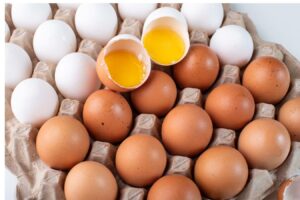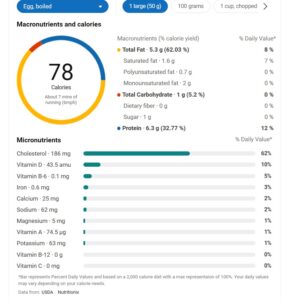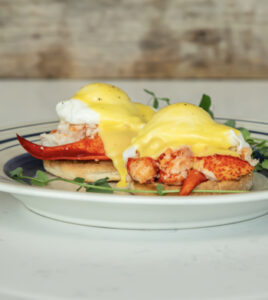
It’s official springtime in the Northern Hemisphere. What’s more evocative of spring than birds happily laying eggs in their nests?
In the last 50 years, chicken eggs have come under scientific and marketing scrutiny and have been presented as either nutritional rock stars or medical villains. So what’s the truth?
The truth is that one large chicken egg does have a lot of important nutrients – notably protein, vitamin D, and vitamin B6 and micronutrients such as choline in one convenient, pre-packaged, 80-calorie oval. Eggs, though, are high in cholesterol. All animals produce cholesterol in their bodies because it’s needed for healthy cell membranes. But too much cholesterol in your bloodstream can be dangerous to heart-health.
As with all things, eggs should be consumed in moderation.

Here are some of your egg questions answered.
Oh no! I have a bunch of eggs in my fridge and I can’t tell if they’re hardboiled or raw. Is there a way to tell?
Yes! You can tell if an egg in its shell is uncooked or hardboiled by spinning it. An uncooked egg will wobble but not spin. A hardboiled egg will spin on its fat bottom. Have some fun!
Is there a way I can tell if my eggs are fresh?
Yes. Put them in a glass of water. A fresh egg will sink while an old egg will float. There is some science. The “white” (albumen) breaks down, releases moisture and increases buoyancy.
Does it matter what colour an egg’s shell is?
No, it doesn’t. The colour of an egg’s shell is determined by the breed of chicken and doesn’t indicate anything about the egg’s flavour, nutritional value, or age.
Why do some eggs have different yolk colours?
The yolk colour is determined by what the hen eats. In factory farming (i.e. how most eggs are produced) the birds are fed grains such as corn or wheat, which produces a paler egg yolk. Birds that go outside and can add grass and insects to their diet will have a darker, almost orange yolk. And yes, those eggs also have more nutritional value.
Is free range the same as free run?
No. In Canada a free range egg comes from a hen who is not in cage but is still kept with many other birds. These birds are typically raised indoors in controlled safe and humane conditions. They are fed a specific premix feed. Free run eggs come from birds who can go outdoors and eat things like grass or insects and often a supplemental premix feed. You’re likely to pay more for free run eggs and can find them at smaller grocers, farmers markets or directly from a farmer. The nutrition for both is still of high quality.
How come in North America we put eggs in the fridge but in Europe they can stay on the counter?
In North America we wash eggs before they’re sold in stores. Washing the eggs removes a naturally occurring protective layer called the bloom. Without the bloom, the eggs need to be refrigerated to stay fresh. In Europe, eggs are not washed before sale. Additionally, we wash the eggs to ensure that any external harmful bacteria are eliminated.
If I’m baking a cake and I run out of eggs, is it possible to replace the eggs with something else?
The answer is a tentative yes, since it will depend on the type of cake. Substitutions won’t work for something like an angel food cake that relies on the eggs for both leavening and body. But in most baked goods, the egg are there to help all the other ingredients hold together. You can replace one egg with ½ cup of mashed fruit such as applesauce or mashed bananas. This fruit could affect the flavour of your batter though if you’re making a milder tasting cake. You can also make a “flax egg”. One flax egg is made from 1 tablespoon of ground flax mixed with 3 tablespoons water. Mix the two ingredients and let the “egg” sit for a few minutes to thicken and then use to replace the eggs in your recipe.

Introducing ...Sunny Gold Sweet Mustard Pickles! Dismiss